In Focus This Week
Who Pays for Election Administration?
The Division of State and Local Responsibilities
Julie Hochsztein, Research Fellow, and April Tan, Policy Lead
Center for Election Innovation & Research
States and local jurisdictions share responsibility for conducting U.S. elections, including paying for expenses associated with election administration and voter registration. However, the division of these funding responsibilities across (or even within) states is often not clear to policymakers, the public, or election administrators. This leads to misunderstandings about who pays for what aspects of election administration.
These misunderstandings can have significant real-world consequences, with election administrators sometimes left scrambling for funds as policymakers and courts make important decisions based on flawed assumptions about election finance overall and specific election expenses like voting machines, training, polling places, and ballots.
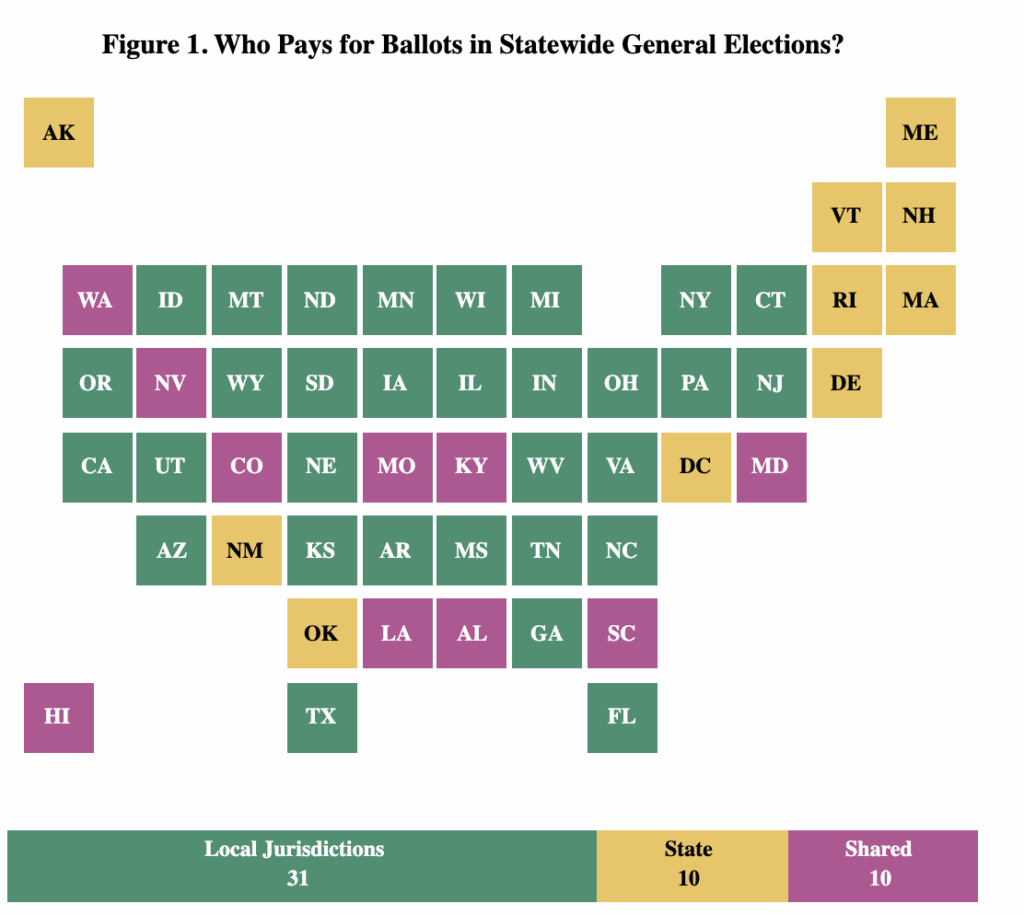
To better clarify funding structures in election administration, the Center for Election Innovation & Research (CEIR) recently released a report detailing which level of government was responsible for various types of election expenses in the administration of statewide general elections in November 2024.
Recent studies have found that many Americans mistakenly believe that the federal government plays a large role in paying for elections. In reality, state and local governments bear the primary burden of paying for elections. The federal government only occasionally makes grants to state and local election offices for specific purposes. These federal funds are unpredictable and insufficient for officials to count on them for administering elections.
CEIR conducted a review of state election statutes and regulations in all 50 states. This review found that, in the vast majority of states, the state and local governments share the financial responsibility of election administration. However, the details of this shared responsibility vary widely from one state to the next.
Using this 50-state review of election funds, a series of brief reports look at how states share the cost of specific aspects of election administration, such as printing ballots , sending election notices, acquiring and maintaining voting equipment , and more. The details of shared responsibility for election funding vary by topic within states as well varying from one state to the next.
A Mix of Local and State Responsibilities
In most states, local governments pay for most election expenses through taxes and other public revenue streams at the county or municipal level. Even when local governments pay most election costs, many states pay or provide for specific aspects of election administration such as voter registration, poll worker training, or sample ballots. Only a handful of states directly pay for most election expenses at the state level.
Some states reimburse local governments for a portion of their election expenses, though the process and amount of this reimbursement vary by state. This is typically accomplished with formulas that are based either on a fixed percentage, proportionally based on the number of registered voters, or some other factor.
For example, in Alabama the state reimburses counties for 50% of most statewide general election expenses, including ballots and supplies, compensation for election officials, and rental payments for polling places. In Colorado, the state reimburses counties for 45% of their election expenses when there is a state or federal level race on the ballot. Hawaii law requires that most election expenses are divided in half between the state and counties, with any statewide expenses divided on a prorated basis based on the number of registered voters in each county.
For more detailed information on the division of responsibility for election expenses in each state, read the full report here.
Digging Deeper into Who Pays for Elections
Additional research dug deeper into granular aspects of election administration. For analysis of the division of funding responsibilities based on specific election expenses, please see other pieces in this series:
“Who Pays for Ballots?”: Options range from requiring separate ballots for state and local contests to cost-sharing formulas to either local or state election officials paying the entire cost.
“Who Pays for Election Notices?”: Forty-eight states require notices about general elections but vary widely in who pays for or issues these notices.
“Who Pays for Voting Equipment?”: Capital purchases including tabulators and voting machines are paid in all or part by state governments in at least eight states with local governments authorized to purchase this equipment in the rest.
More research on election finance and funding
This report is part of CEIR’s ongoing research into election finance and funding. Other reports from this research include “The Ways States Pay for Election Administration ” and “Restrictions on Private Funding for Elections[CM10] .” To learn more about these and other topics of election administration and voter registration, visit electioninnovation.org/research/.
electionline Daily News Email
 What’s the best part of waking up? electionline Daily News in your inbox of course so be sure to sign up for your daily dose.
What’s the best part of waking up? electionline Daily News in your inbox of course so be sure to sign up for your daily dose.
Each morning you’ll receive the top headlines of the day, plus a listing of states featured in that day’s news round up.
To sign up, simply visit our site and provide us with your email and you’ll begin receiving the news in your inbox each morning.
We Google so you don’t have to!
Election News This Week
 New Audits: A hand-counted audit of municipal election results performed by the Fairbanks North Star Borough, Alaska has shown complete agreement with the count given by voting machines in the borough. Under an April ordinance, which passed in an assembly vote of 5-4, the borough’s Canvass Board must hand-count results from early voting ballots for a randomly selected contested race, as well as ballots from a randomly chosen race from each of two randomly chosen precincts, for a total of three blocks of votes. According to April Trickey, auditors counted 2,846 ballots from the race for school board seat C from early voting, as well as 492 ballots from borough assembly seat B between both Goldstream 2 and Moose Creek precincts. In order to perform the count, which Trickey said took about five hours between the combined races, the three auditors first had to separate borough ballots from those of other jurisdictions. To perform the added tasks this election year required, Trickey hired two extra members of the Canvass Board, folding auditors into the general verification process once the hand-count was completed. The final results from each of these counts agreed fully with the count from the Dominion voting machines, a conclusion that Trickey said took a couple of counts to determine for the early vote precinct. “You have X amount of ballots that’s been cast in that race. You have so many that nobody voted, you have so many, maybe, over votes, and then you have so many write-ins, and then where they found is their sort was incorrect on how they sorted the ovals for the two candidates that were on the ballot,” she explained.
New Audits: A hand-counted audit of municipal election results performed by the Fairbanks North Star Borough, Alaska has shown complete agreement with the count given by voting machines in the borough. Under an April ordinance, which passed in an assembly vote of 5-4, the borough’s Canvass Board must hand-count results from early voting ballots for a randomly selected contested race, as well as ballots from a randomly chosen race from each of two randomly chosen precincts, for a total of three blocks of votes. According to April Trickey, auditors counted 2,846 ballots from the race for school board seat C from early voting, as well as 492 ballots from borough assembly seat B between both Goldstream 2 and Moose Creek precincts. In order to perform the count, which Trickey said took about five hours between the combined races, the three auditors first had to separate borough ballots from those of other jurisdictions. To perform the added tasks this election year required, Trickey hired two extra members of the Canvass Board, folding auditors into the general verification process once the hand-count was completed. The final results from each of these counts agreed fully with the count from the Dominion voting machines, a conclusion that Trickey said took a couple of counts to determine for the early vote precinct. “You have X amount of ballots that’s been cast in that race. You have so many that nobody voted, you have so many, maybe, over votes, and then you have so many write-ins, and then where they found is their sort was incorrect on how they sorted the ovals for the two candidates that were on the ballot,” she explained.
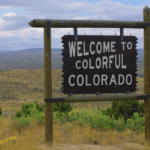 More Languages: In an effort to boost accessibility for voters whose primary language is not English, Colorado Secretary of State Jena Griswold announced a new initiative targeting Spanish-speaking constituents. The state department’s website, VayaVotarColorado.gov, highlights resources aimed at providing accurate election information and voter registration services in Spanish. “It is important that every voter has access to accurate information when it comes to registering to vote and casting a ballot,” Secretary Griswold said. This outreach is part of a broader campaign by the Colorado government to ensure fair election processes for all eligible voters. VayaVotarColorado.gov will allow users to execute key electoral actions, such as registering to vote, updating their information, and finding local voting centers. In addition to online resources, starting this week, Coloradans can call a new multilingual hotline for live translation assistance with their ballots. This service extends support beyond Spanish, offering help in Vietnamese, Korean, Taiwanese, Chinese, and additional languages, addressing the linguistic diversity within the voter base. However, limitations on the assistance have been set to adhere to Colorado state laws. Interpreters are restricted to translating the content on the ballot but can’t stray into explaining Blue Book content or providing instructions on how to complete the ballot itself. Voters can gain access to an interpreter for ballot content by contacting their County Clerk, asking election judges or county staff at voting centers, or directly calling the Secretary of State’s Office.
More Languages: In an effort to boost accessibility for voters whose primary language is not English, Colorado Secretary of State Jena Griswold announced a new initiative targeting Spanish-speaking constituents. The state department’s website, VayaVotarColorado.gov, highlights resources aimed at providing accurate election information and voter registration services in Spanish. “It is important that every voter has access to accurate information when it comes to registering to vote and casting a ballot,” Secretary Griswold said. This outreach is part of a broader campaign by the Colorado government to ensure fair election processes for all eligible voters. VayaVotarColorado.gov will allow users to execute key electoral actions, such as registering to vote, updating their information, and finding local voting centers. In addition to online resources, starting this week, Coloradans can call a new multilingual hotline for live translation assistance with their ballots. This service extends support beyond Spanish, offering help in Vietnamese, Korean, Taiwanese, Chinese, and additional languages, addressing the linguistic diversity within the voter base. However, limitations on the assistance have been set to adhere to Colorado state laws. Interpreters are restricted to translating the content on the ballot but can’t stray into explaining Blue Book content or providing instructions on how to complete the ballot itself. Voters can gain access to an interpreter for ballot content by contacting their County Clerk, asking election judges or county staff at voting centers, or directly calling the Secretary of State’s Office.
 More Transparency: The Nevada Secretary of State’s Office is launching a new site to increase transparency with the public and increase confidence in Nevada’s safe and secure elections. The new site details how election complaints and reported violations are investigated, outlines some of the safeguards in the process and shares examples of some of the most reported complaints. “While very few allegations result in actual violations of election law when investigated, educating the public on the investigative process will help clear up misconceptions and increase confidence in Nevada’s safe and secure elections,” said Secretary of State Francisco Aguilar. “Every report of an election violation is taken seriously and investigated by the Secretary of State’s Office. I’m proud of the work done at the state-level to increase transparency for the public and uphold the integrity of our electoral process.”
More Transparency: The Nevada Secretary of State’s Office is launching a new site to increase transparency with the public and increase confidence in Nevada’s safe and secure elections. The new site details how election complaints and reported violations are investigated, outlines some of the safeguards in the process and shares examples of some of the most reported complaints. “While very few allegations result in actual violations of election law when investigated, educating the public on the investigative process will help clear up misconceptions and increase confidence in Nevada’s safe and secure elections,” said Secretary of State Francisco Aguilar. “Every report of an election violation is taken seriously and investigated by the Secretary of State’s Office. I’m proud of the work done at the state-level to increase transparency for the public and uphold the integrity of our electoral process.”
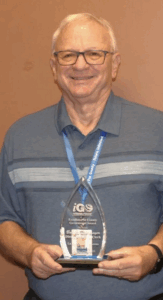 Congratulations: La Paz County, Arizona Elections Director and Deputy Clerk of the Board Bob Bartelsmeyer was the recipient of a 2025 Excellence in County Government Award from the International Association of Government Officials. He was nominated by County Executive Assistant Tracy Page. Bartelsmeyer said he had no idea Page had nominated him. In addition to being Elections Director, he is currently serving as the Secretary of the IAGO’s Executive Board. On the nomination form, Page said Bartelsmeyer had dedicated over four decades to advancing election integrity and transparency. He came to La Paz County three-and-a-half years ago from Missouri. He has also served in Colorado, Florida and New Mexico. He has also been an international elections observer and has been in delegations for international local government exchange programs. “As a Certified Elections Official, he has implemented new voter registration and voting system, conducted numerous recounts and audits, consistently advocated for adherence to legal standards in election administration,” Page said.
Congratulations: La Paz County, Arizona Elections Director and Deputy Clerk of the Board Bob Bartelsmeyer was the recipient of a 2025 Excellence in County Government Award from the International Association of Government Officials. He was nominated by County Executive Assistant Tracy Page. Bartelsmeyer said he had no idea Page had nominated him. In addition to being Elections Director, he is currently serving as the Secretary of the IAGO’s Executive Board. On the nomination form, Page said Bartelsmeyer had dedicated over four decades to advancing election integrity and transparency. He came to La Paz County three-and-a-half years ago from Missouri. He has also served in Colorado, Florida and New Mexico. He has also been an international elections observer and has been in delegations for international local government exchange programs. “As a Certified Elections Official, he has implemented new voter registration and voting system, conducted numerous recounts and audits, consistently advocated for adherence to legal standards in election administration,” Page said.
 Podcast News: High Turnout Wide Margins recently traveled to the 40th annual Election Center conference in Salt Lake City, Utah, and spoke with election administrations and officials from across the county about how they do the work of elections in their communities. In this episode, hosts Eric Fey and Brianna Lennon speak with Lisa Marie Manning Bridges, the Registrar of Voters in the Parish of Orleans in Louisiana. They spoke about the unique nature of Louisiana elections, how the work is divvied up by different parish offices and how the parish works alongside the Louisiana Secretary of State to serve their voters. In the latest episode of The Voting Booth from the American Enterprise Institute, co-hosts John Fortier and Don Palmer are joined by Rodney Davis, former U.S. Representative for Illinois’ 13th district to discuss Congress and its elections under threat. Republicans, both in Congress and at the state level, are continuing a push to restrict voting by U.S. citizens living abroad. On this episode of the NPR Politics Podcast, the hosts discuss what those restrictions could look like and what they could mean for voters, including those who live in the country. This episode: political correspondent Ashley Lopez, voting correspondent Hansi Lo Wang, and voting correspondent Miles Parks. On a recent episode of Code Switch from NPR, Stacey Abrams discusses how voter suppression threatens democracy. On another recent episode of Code Switch, the hosts discuss why voting rights are at risk.
Podcast News: High Turnout Wide Margins recently traveled to the 40th annual Election Center conference in Salt Lake City, Utah, and spoke with election administrations and officials from across the county about how they do the work of elections in their communities. In this episode, hosts Eric Fey and Brianna Lennon speak with Lisa Marie Manning Bridges, the Registrar of Voters in the Parish of Orleans in Louisiana. They spoke about the unique nature of Louisiana elections, how the work is divvied up by different parish offices and how the parish works alongside the Louisiana Secretary of State to serve their voters. In the latest episode of The Voting Booth from the American Enterprise Institute, co-hosts John Fortier and Don Palmer are joined by Rodney Davis, former U.S. Representative for Illinois’ 13th district to discuss Congress and its elections under threat. Republicans, both in Congress and at the state level, are continuing a push to restrict voting by U.S. citizens living abroad. On this episode of the NPR Politics Podcast, the hosts discuss what those restrictions could look like and what they could mean for voters, including those who live in the country. This episode: political correspondent Ashley Lopez, voting correspondent Hansi Lo Wang, and voting correspondent Miles Parks. On a recent episode of Code Switch from NPR, Stacey Abrams discusses how voter suppression threatens democracy. On another recent episode of Code Switch, the hosts discuss why voting rights are at risk.
 Sticker News: Congratulations to Annabelle Morton, who attends elementary school in the Albany City
Sticker News: Congratulations to Annabelle Morton, who attends elementary school in the Albany City 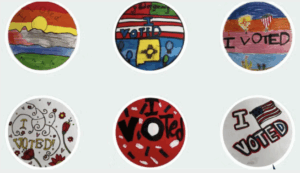 School District for winning this year’s Albany County, New York “I Voted” sticker contest. Morton unveiled her winning ‘I voted’ sticker design to the Albany County Legislature this week. Morton’s design depicts the City of Albany skyline, a row of tulips, and the iconic statue of Nipper the Dog on a red, white, and blue background. According to Albany County, Annabelle won more than 99% of the votes in this year’s contest. Stickers designed by Albuquerque Public Schools students are back for the 2025 election in Bernalillo County, New Mexico. Voters can celebrate casting their ballot with “I Voted” stickers APS art students designed. It comes a year after the Bernalillo County Clerk’s Office received more than 200 sticker designs for the contest. The clerk’s office picked six new designs from that stack of 200-plus. “The creativity and effort these students put into their designs was amazing,” clerk Michelle S. Kavanaugh said. “We wanted to highlight more of their artwork and continue sharing their talent with the community.”
School District for winning this year’s Albany County, New York “I Voted” sticker contest. Morton unveiled her winning ‘I voted’ sticker design to the Albany County Legislature this week. Morton’s design depicts the City of Albany skyline, a row of tulips, and the iconic statue of Nipper the Dog on a red, white, and blue background. According to Albany County, Annabelle won more than 99% of the votes in this year’s contest. Stickers designed by Albuquerque Public Schools students are back for the 2025 election in Bernalillo County, New Mexico. Voters can celebrate casting their ballot with “I Voted” stickers APS art students designed. It comes a year after the Bernalillo County Clerk’s Office received more than 200 sticker designs for the contest. The clerk’s office picked six new designs from that stack of 200-plus. “The creativity and effort these students put into their designs was amazing,” clerk Michelle S. Kavanaugh said. “We wanted to highlight more of their artwork and continue sharing their talent with the community.”
Personnel News: Chatham County, Georgia Elections Supervisor Billy Wooten is stepping down and will take on a part-time role as an election officer. John Richardson will be the next Davidson County, Tennessee elections administrator. Former Democratic state representative Vernon Jones has launched a bid for Georgia’s secretary of state. Assistant County Manager Lisa Wurtzbacher will serve as the interim director of the New Hanover County, North Carolina Board of Elections
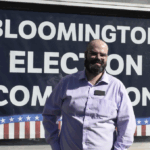 In Memoriam: Bloomington, Illinois Election Commission Executive Director Luke Stremlau has died after a brief illness. He was 42. Bloomington Election commissioner Terry Luce said the commission is “very saddened by his loss.” “Luke loved the Bloomington Election Commission and what we stood for. He worked hard to help us maintain the integrity of the elections for the voters,” Luce said in a statement to WGLT. Fellow commissioner Jim Fruin called Stremlau a “true professional” and a “true gentleman.” Stremlau was named the commission’s executive director in September 2022. He previously worked as Keplr Vision in Bloomington and earned an associate’s degree from Heartland Community College, according to the commission. McLean County Clerk Kathy Michael, whose office oversees elections outside of Bloomington, noted her office worked regularly with Stremlau. “We are heartbroken for his family, friends, and staff at BEC. We at the McLean County Clerk’s office and all of McLean County, are here for you,” Michael said in a post to social media. “He was thorough and meticulous in everything he touched. He always stressed teamwork with his staff and valued their consistency and relationships with each other. He took his responsibility to the public very seriously and was a rule follower who did not take shortcuts,” said Fruin.
In Memoriam: Bloomington, Illinois Election Commission Executive Director Luke Stremlau has died after a brief illness. He was 42. Bloomington Election commissioner Terry Luce said the commission is “very saddened by his loss.” “Luke loved the Bloomington Election Commission and what we stood for. He worked hard to help us maintain the integrity of the elections for the voters,” Luce said in a statement to WGLT. Fellow commissioner Jim Fruin called Stremlau a “true professional” and a “true gentleman.” Stremlau was named the commission’s executive director in September 2022. He previously worked as Keplr Vision in Bloomington and earned an associate’s degree from Heartland Community College, according to the commission. McLean County Clerk Kathy Michael, whose office oversees elections outside of Bloomington, noted her office worked regularly with Stremlau. “We are heartbroken for his family, friends, and staff at BEC. We at the McLean County Clerk’s office and all of McLean County, are here for you,” Michael said in a post to social media. “He was thorough and meticulous in everything he touched. He always stressed teamwork with his staff and valued their consistency and relationships with each other. He took his responsibility to the public very seriously and was a rule follower who did not take shortcuts,” said Fruin.
Ballot Measures, Legislation & Rulemaking
 Federal Legislation: Democrats in the House and Senate introduced new legislation that seeks to raise the legal bar for states to purge voters based on several factors, such as inactivity or changing residency within the same state. The Voter Purge Protection Act, introduced by Sen. Alex Padilla, D-Calif., and Rep. Joyce Beatty, D-Ohio, would amend the National Voter Registration Act to make it more difficult for states to kick large numbers of voters off their rolls for actions that Democrats — and many election officials — say are common, overwhelmingly benign and not indicative of voter fraud. Padilla told reporters that the legislation would help ensure “that Americans cannot be stripped of their right to vote without proof that a voter has either passed away or has permanently moved out of their state.” Voters targeted for removal must also be notified by election officials “so that there’s no surprise when they show up to vote on election day that their name is not on the list and it’s too late to address whatever the issue may or may not be,” Padilla said. The bill has 22 Democratic co-sponsors in the Senate and 24 in the House but is unlikely to gain serious consideration under a Republican-controlled Congress, where most GOP members have long believed voter fraud is rampant and are broadly supportive of state and federal efforts to remove voters based on those same factors.
Federal Legislation: Democrats in the House and Senate introduced new legislation that seeks to raise the legal bar for states to purge voters based on several factors, such as inactivity or changing residency within the same state. The Voter Purge Protection Act, introduced by Sen. Alex Padilla, D-Calif., and Rep. Joyce Beatty, D-Ohio, would amend the National Voter Registration Act to make it more difficult for states to kick large numbers of voters off their rolls for actions that Democrats — and many election officials — say are common, overwhelmingly benign and not indicative of voter fraud. Padilla told reporters that the legislation would help ensure “that Americans cannot be stripped of their right to vote without proof that a voter has either passed away or has permanently moved out of their state.” Voters targeted for removal must also be notified by election officials “so that there’s no surprise when they show up to vote on election day that their name is not on the list and it’s too late to address whatever the issue may or may not be,” Padilla said. The bill has 22 Democratic co-sponsors in the Senate and 24 in the House but is unlikely to gain serious consideration under a Republican-controlled Congress, where most GOP members have long believed voter fraud is rampant and are broadly supportive of state and federal efforts to remove voters based on those same factors.
 Shasta County, California: This week, the Shasta County Board of Supervisors issued a unanimous statement in support of the free press after Registrar of Voters Clint Curtis said he would no longer provide press releases to Shasta Scout, a local nonprofit newsroom. After the closed session board meeting today, Oct. 14, Board Chair Kevin Crye shared a statement on behalf of all five board members, including three who voted to appoint Curtis just five months ago. “The board unanimously respects the right of the press to have free and unfettered access to public information,” Crye said. “We condemn Mr. Curtis’ action of excluding the press and encourage him to maintain a high level of transparency and access to public information.” “If it occurs again, the board will move to censure,” Crye concluded, as a number of audience members clapped in response. In an interview with reporters after the meeting, Curtis said supervisors were confused indicating that this was not a matter of free speech. He said he didn’t want to share press releases with Shasta Scout because doing so seemed “morally wrong” due to his belief that the organization is “operating improperly” by reporting the news while registered as a nonprofit. Moving forward, Curtis said, he will provide press releases on the Shasta’s election website so they’re available to everyone.
Shasta County, California: This week, the Shasta County Board of Supervisors issued a unanimous statement in support of the free press after Registrar of Voters Clint Curtis said he would no longer provide press releases to Shasta Scout, a local nonprofit newsroom. After the closed session board meeting today, Oct. 14, Board Chair Kevin Crye shared a statement on behalf of all five board members, including three who voted to appoint Curtis just five months ago. “The board unanimously respects the right of the press to have free and unfettered access to public information,” Crye said. “We condemn Mr. Curtis’ action of excluding the press and encourage him to maintain a high level of transparency and access to public information.” “If it occurs again, the board will move to censure,” Crye concluded, as a number of audience members clapped in response. In an interview with reporters after the meeting, Curtis said supervisors were confused indicating that this was not a matter of free speech. He said he didn’t want to share press releases with Shasta Scout because doing so seemed “morally wrong” due to his belief that the organization is “operating improperly” by reporting the news while registered as a nonprofit. Moving forward, Curtis said, he will provide press releases on the Shasta’s election website so they’re available to everyone.
 Michigan Ballot Measure: The Michigan Association of County Clerks unanimously voted to oppose a ballot measure seeking to establish ranked choice voting in Michigan, which is being put forth by Rank MI Vote for potential inclusion in the 2026 election. The clerks cited concerns about timeliness of the certification of elections, confusion by voters and delays to any recounts or audits in their opposition to the measure. “Michigan voters are used to knowing who won an election in a timely manner, so it’s incredibly important that we’re able to report accurate, unofficial results on election night,” said Kent County Clerk Lisa Posthumus Lyons in a press release from the association. “Determining a winner will take drastically longer under ranked-choice voting. Delayed results erode the public’s trust by fueling uncertainty and misinformation.” Marquette County Clerk Linda Talsma, who chairs the association, also noted in the release that while they do not generally take positions on ballot measures, the bipartisan group of county officials felt it necessary to urge voters to reject the initiative in this case. “Michigan voters already face some of the longest and most complex ballots in the nation, covering federal, state, county, city, township, school, and special district contests on a single ballot,” reads the official resolution passed by the clerks’ association. “The RankMIVote proposal would further complicate ballots by requiring voters to numerically rank candidates in certain contests while others remain unchanged, adding inconsistency, voter confusion, and voter fatigue.”
Michigan Ballot Measure: The Michigan Association of County Clerks unanimously voted to oppose a ballot measure seeking to establish ranked choice voting in Michigan, which is being put forth by Rank MI Vote for potential inclusion in the 2026 election. The clerks cited concerns about timeliness of the certification of elections, confusion by voters and delays to any recounts or audits in their opposition to the measure. “Michigan voters are used to knowing who won an election in a timely manner, so it’s incredibly important that we’re able to report accurate, unofficial results on election night,” said Kent County Clerk Lisa Posthumus Lyons in a press release from the association. “Determining a winner will take drastically longer under ranked-choice voting. Delayed results erode the public’s trust by fueling uncertainty and misinformation.” Marquette County Clerk Linda Talsma, who chairs the association, also noted in the release that while they do not generally take positions on ballot measures, the bipartisan group of county officials felt it necessary to urge voters to reject the initiative in this case. “Michigan voters already face some of the longest and most complex ballots in the nation, covering federal, state, county, city, township, school, and special district contests on a single ballot,” reads the official resolution passed by the clerks’ association. “The RankMIVote proposal would further complicate ballots by requiring voters to numerically rank candidates in certain contests while others remain unchanged, adding inconsistency, voter confusion, and voter fatigue.”
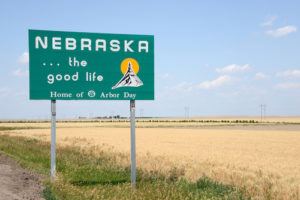 Nebraska Ballot Measure: Advocates for All Nebraskans, a nonprofit behind a handful of Nebraska ballot initiatives announced a campaign this week to gather signatures for two new ones aimed at conservative election goals. One would alter how the state awards Electoral College votes for president, giving all five to the winner of the popular vote statewide. The other would require elections in the state to be conducted exclusively using paper ballots counted by hand. The winner-take-all constitutional amendment is identical to State Sen. Myron Dorn of Adams’ legislative resolution this year on letting voters decide whether to shift the state to winner-take-all, which did not get scheduled for a vote. A separate proposal to make the change in statute from State Sen. Loren Lippincott, Legislative Bill 3, fell to a filibuster. The proposed constitutional amendment for paper ballots and hand counting would ban many voting machines from being used. Voting machines that produce voter-verifiable paper records like Nebraska’s would be exempt. It would require all elections to be done by paper ballot by July 2027. The group would need to gather the signatures of 10 percent of the state’s registered voters for the winner-take-all initiative that would change the state constitution. The hand-counting ballot initiative would need 7 percent of the state’s registered voters, since that one is changing state law. Both have until July to get on the November 2026 ballot.
Nebraska Ballot Measure: Advocates for All Nebraskans, a nonprofit behind a handful of Nebraska ballot initiatives announced a campaign this week to gather signatures for two new ones aimed at conservative election goals. One would alter how the state awards Electoral College votes for president, giving all five to the winner of the popular vote statewide. The other would require elections in the state to be conducted exclusively using paper ballots counted by hand. The winner-take-all constitutional amendment is identical to State Sen. Myron Dorn of Adams’ legislative resolution this year on letting voters decide whether to shift the state to winner-take-all, which did not get scheduled for a vote. A separate proposal to make the change in statute from State Sen. Loren Lippincott, Legislative Bill 3, fell to a filibuster. The proposed constitutional amendment for paper ballots and hand counting would ban many voting machines from being used. Voting machines that produce voter-verifiable paper records like Nebraska’s would be exempt. It would require all elections to be done by paper ballot by July 2027. The group would need to gather the signatures of 10 percent of the state’s registered voters for the winner-take-all initiative that would change the state constitution. The hand-counting ballot initiative would need 7 percent of the state’s registered voters, since that one is changing state law. Both have until July to get on the November 2026 ballot.
 Ohio: State Senator Theresa Gavarone (R-Bowling Green) has introduced legislation that could change Ohio’s absentee ballot deadline. If signed into law, Senate Bill 293 would require all mail-in absentee ballots to be delivered to county boards of elections by the time polls close on Election Day. Current state law allows absentee ballots postmarked by Election Day to be counted if they arrive within four days following. Gaverone stated the proposal would bring Ohio’s process in line with federal election standards and recent executive orders signed by President Donald Trump back in March, which directed the U.S. Attorney General to enforce laws requiring ballots to be received by Election Day for counting. Gavarone is co-sponsoring the bill with Senator Andrew Brenner (R-Delaware). The legislation has been referred to the Senate General Government Committee for consideration.
Ohio: State Senator Theresa Gavarone (R-Bowling Green) has introduced legislation that could change Ohio’s absentee ballot deadline. If signed into law, Senate Bill 293 would require all mail-in absentee ballots to be delivered to county boards of elections by the time polls close on Election Day. Current state law allows absentee ballots postmarked by Election Day to be counted if they arrive within four days following. Gaverone stated the proposal would bring Ohio’s process in line with federal election standards and recent executive orders signed by President Donald Trump back in March, which directed the U.S. Attorney General to enforce laws requiring ballots to be received by Election Day for counting. Gavarone is co-sponsoring the bill with Senator Andrew Brenner (R-Delaware). The legislation has been referred to the Senate General Government Committee for consideration.
Legal Updates
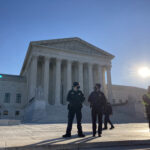 U.S. Supreme Court: The Supreme Court appeared ready to strike down a 2024 congressional map that a group of voters has challenged as the product of unconstitutional racial gerrymandering – that is, according to them, it sorts voters based on race in violation of the 14th Amendment’s equal protection clause. During nearly two-and-a-half hours of oral arguments, the court’s conservative justices signaled that they are likely to undermine a key provision of the Voting Rights Act, even if they may not ultimately strike it down altogether. This week’s oral argument was the latest chapter in a dispute that dates back to 2022, when Louisiana adopted a new congressional map in the wake of the 2020 census. Roughly one-third of the state’s population is Black, but the 2022 map had only one majority-Black district out of the six districts allotted to the state. That prompted a group of Black voters to go to federal court, where they argued that the 2022 map violated Section 2 of the federal Voting Rights Act, which bars discrimination in voting practices. At this week’s oral argument, lawyer Janai Nelson, representing the Black voters, defended the 2024 map. She told the justices that “[a] mere two years ago, in Allen versus Milligan, a case nearly identical to” this one, the Supreme Court “noted that under certain circumstances, it has authorized race-based redistricting to remedy state redistricting maps that violate Section 2.” Louisiana Solicitor General Benjamin Aguiñaga, by contrast, urged the court to “reevaluate its voting precedents.” Although the state had defended the 2024 map when the case was before the Supreme Court in March, Aguiñaga told the justices on Wednesday that those precedents had “placed states in impossible situations where the only sure demand is more racial discrimination for more decades.” Therefore, he said, “we have taken the position that Section 2, insofar as it requires race-based redistricting, is unconstitutional.”
U.S. Supreme Court: The Supreme Court appeared ready to strike down a 2024 congressional map that a group of voters has challenged as the product of unconstitutional racial gerrymandering – that is, according to them, it sorts voters based on race in violation of the 14th Amendment’s equal protection clause. During nearly two-and-a-half hours of oral arguments, the court’s conservative justices signaled that they are likely to undermine a key provision of the Voting Rights Act, even if they may not ultimately strike it down altogether. This week’s oral argument was the latest chapter in a dispute that dates back to 2022, when Louisiana adopted a new congressional map in the wake of the 2020 census. Roughly one-third of the state’s population is Black, but the 2022 map had only one majority-Black district out of the six districts allotted to the state. That prompted a group of Black voters to go to federal court, where they argued that the 2022 map violated Section 2 of the federal Voting Rights Act, which bars discrimination in voting practices. At this week’s oral argument, lawyer Janai Nelson, representing the Black voters, defended the 2024 map. She told the justices that “[a] mere two years ago, in Allen versus Milligan, a case nearly identical to” this one, the Supreme Court “noted that under certain circumstances, it has authorized race-based redistricting to remedy state redistricting maps that violate Section 2.” Louisiana Solicitor General Benjamin Aguiñaga, by contrast, urged the court to “reevaluate its voting precedents.” Although the state had defended the 2024 map when the case was before the Supreme Court in March, Aguiñaga told the justices on Wednesday that those precedents had “placed states in impossible situations where the only sure demand is more racial discrimination for more decades.” Therefore, he said, “we have taken the position that Section 2, insofar as it requires race-based redistricting, is unconstitutional.”
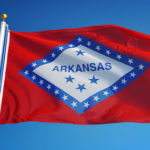 Arkansas: Pulaski County Circuit Judge Patricia James said she would issue a ruling quickly in a lawsuit seeking to move up the dates of the Senate District 26 special election after a hearing this week. The lawsuit seeks an earlier date for a special election to fill the seat left vacant by the death of Branch Republican Sen. Gary Stubblefield. The suit alleges the current schedule prevents District 26 voters from having a voice during the 2026 fiscal session, which begins in April. The attorney general’s office is representing the defendants, Gov. Sarah Huckabee Sanders and Secretary of State Cole Jester. During this week’s hearing, Senior Assistant Attorney General Ryan Hale said the case should be dismissed because the plaintiff failed to state a claim and because of sovereign immunity, the legal doctrine that the state cannot be sued in its own courts. James said she understood the time-sensitivity of the case at the end of the two-hour hearing, but didn’t issue a ruling. “I know it’s important to everyone here” that a decision be made in the case soon, James told the packed courtroom. “It will be quick.”
Arkansas: Pulaski County Circuit Judge Patricia James said she would issue a ruling quickly in a lawsuit seeking to move up the dates of the Senate District 26 special election after a hearing this week. The lawsuit seeks an earlier date for a special election to fill the seat left vacant by the death of Branch Republican Sen. Gary Stubblefield. The suit alleges the current schedule prevents District 26 voters from having a voice during the 2026 fiscal session, which begins in April. The attorney general’s office is representing the defendants, Gov. Sarah Huckabee Sanders and Secretary of State Cole Jester. During this week’s hearing, Senior Assistant Attorney General Ryan Hale said the case should be dismissed because the plaintiff failed to state a claim and because of sovereign immunity, the legal doctrine that the state cannot be sued in its own courts. James said she understood the time-sensitivity of the case at the end of the two-hour hearing, but didn’t issue a ruling. “I know it’s important to everyone here” that a decision be made in the case soon, James told the packed courtroom. “It will be quick.”
Arkansas Attorney General Tim Griffin said his office has obtained warrants to arrest two men, including paper ballot advocate Conrad Reynolds, on a misdemeanor charge related to the November 2024 general election. Reynolds, a retired U.S. Army colonel who lost bids for the Republican nomination in Arkansas’ 2nd congressional district in 2014 and 2022, and Dustin Black are accused of violating Arkansas Code §7-1-103, which prohibits electioneering within 100 feet of the entrance to a building where voting is taking place or being there for any purpose except to enter or leave the building. Reynolds of Conway is the leader of a group that has been advocating for counties to switch from voting machines to hand-marked and hand-counted ballots. “The evidence in this case includes a video of both men conducting exit polling approximately 30 feet from a polling site,” Griffin said in the news release. “This case, and the misdemeanor warrants we obtained, are about one thing: following the law,” he added.
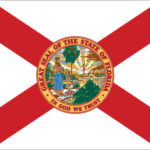 Florida: Maria Bautista, 26 of Marion County, was sentenced after being convicted of voter fraud. Bautista was originally arrested in 2023 after investigators uncovered a petition fraud scheme. She unlawfully used personal information of multiple people, including Marion County’s Supervisor of Elections Wesley Wilcox, to forge ballot petition signatures. Judges sentenced her to four-and-a-half years in prison for 13 counts of Fraudulent Use of Personal Information.
Florida: Maria Bautista, 26 of Marion County, was sentenced after being convicted of voter fraud. Bautista was originally arrested in 2023 after investigators uncovered a petition fraud scheme. She unlawfully used personal information of multiple people, including Marion County’s Supervisor of Elections Wesley Wilcox, to forge ballot petition signatures. Judges sentenced her to four-and-a-half years in prison for 13 counts of Fraudulent Use of Personal Information.
 Hawai’i: The Republican National Committee sued the state of Hawaiʻi and its chief election officer this week, claiming Hawaiʻi was violating laws by failing to provide information about how it maintains voter registration records. Chief Election Officer Scott Nago failed to address the RNC’s questions about what records the state maintains regarding voter rolls, the suit says, adding that this violates Hawai‘i’s open records law and federal disclosure requirements. The suit was filed in Honolulu’s First Circuit Court. Hawaiʻi law states that the counties, not the state, are responsible for maintaining and updating voter rolls, and the suit acknowledged that Nago had advised the RNC to contact the counties directly. But the suit argues that under the National Voter Registration Act of 1993 all states are required to “conduct a general program that makes a reasonable effort to remove the names of ineligible voters from the official lists of eligible voters.” “It would be highly unlikely for the Office not to have any of the types of records requested, such as memos, manuals, policies, emails, or voter registration data,” the suit states. It added that the RNC reached out to elections officials on Kauaʻi and Hawaiʻi island for information about voters and was told to contact the state.
Hawai’i: The Republican National Committee sued the state of Hawaiʻi and its chief election officer this week, claiming Hawaiʻi was violating laws by failing to provide information about how it maintains voter registration records. Chief Election Officer Scott Nago failed to address the RNC’s questions about what records the state maintains regarding voter rolls, the suit says, adding that this violates Hawai‘i’s open records law and federal disclosure requirements. The suit was filed in Honolulu’s First Circuit Court. Hawaiʻi law states that the counties, not the state, are responsible for maintaining and updating voter rolls, and the suit acknowledged that Nago had advised the RNC to contact the counties directly. But the suit argues that under the National Voter Registration Act of 1993 all states are required to “conduct a general program that makes a reasonable effort to remove the names of ineligible voters from the official lists of eligible voters.” “It would be highly unlikely for the Office not to have any of the types of records requested, such as memos, manuals, policies, emails, or voter registration data,” the suit states. It added that the RNC reached out to elections officials on Kauaʻi and Hawaiʻi island for information about voters and was told to contact the state.
 Illinois: DuPage County Clerk Jean Kaczmarek is asking for a judge’s help to get two key vendors who provide election-related services paid. Last week, the clerk’s office filed a motion for a temporary restraining order to get two bills — totaling more than $230,000 — paid so the county can plan for the 2026 election. In the motion, both companies indicated they would no longer work with the county unless they receive payment and are given assurances that they will be paid for work related to the 2026 election. “Elections must be planned months in advance,” Kaczmarek said in a written statement. “The time to contract with our vendors for the primary is now, and no business will agree to work they aren’t being paid for. The voters elected me to administer elections, and my efforts to do so continue to be illegally obstructed.” The two bills prompted the DuPage County state’s attorney’s office earlier this year to request a special prosecutor to conduct an investigation to determine if the clerk’s office violated state laws regarding competitive bidding. The Illinois attorney general’s office was appointed to the complaint but has not yet made a ruling or issued any findings.
Illinois: DuPage County Clerk Jean Kaczmarek is asking for a judge’s help to get two key vendors who provide election-related services paid. Last week, the clerk’s office filed a motion for a temporary restraining order to get two bills — totaling more than $230,000 — paid so the county can plan for the 2026 election. In the motion, both companies indicated they would no longer work with the county unless they receive payment and are given assurances that they will be paid for work related to the 2026 election. “Elections must be planned months in advance,” Kaczmarek said in a written statement. “The time to contract with our vendors for the primary is now, and no business will agree to work they aren’t being paid for. The voters elected me to administer elections, and my efforts to do so continue to be illegally obstructed.” The two bills prompted the DuPage County state’s attorney’s office earlier this year to request a special prosecutor to conduct an investigation to determine if the clerk’s office violated state laws regarding competitive bidding. The Illinois attorney general’s office was appointed to the complaint but has not yet made a ruling or issued any findings.
 Indiana: U.S. District Judge Richard L. Young refused to dismiss a lawsuit challenging Indiana’s student ID voting ban — a procedural win for young voters and pro-voting advocates who say the GOP-backed law was designed to suppress student voting. Young denied Republicans’ motion to dismiss a case brought by students and voting rights groups against Indiana. The ruling means the challenge can proceed — and the court’s detailed reasoning suggests it’s extremely skeptical about the law’s constitutionality. “By removing a form of identification used by ‘tens of thousands of young voters’ in Indiana, SB 10 makes voting more difficult for student voters than it was before the law was enacted,” Young wrote. “Plaintiffs have alleged facts that plausibly suggest that they are entitled to relief under the First, Fourteenth, and Twenty-Sixth Amendments.” For months, voting rights advocates have argued that Senate Bill 10 (SB 10), passed by the GOP-controlled legislature earlier this year, intentionally targeted college students, many of whom lean Democratic, by eliminating their public university-issued IDs as acceptable identification for voting. “Students seeking alternative forms of identification face special barriers at every step of the process,” Young noted. “Obtaining a state ID card from the Indiana Bureau of Motor Vehicles (‘BMV’) requires time, travel, and documentation that can be difficult to obtain and that students are significantly less likely to have than older voters.”
Indiana: U.S. District Judge Richard L. Young refused to dismiss a lawsuit challenging Indiana’s student ID voting ban — a procedural win for young voters and pro-voting advocates who say the GOP-backed law was designed to suppress student voting. Young denied Republicans’ motion to dismiss a case brought by students and voting rights groups against Indiana. The ruling means the challenge can proceed — and the court’s detailed reasoning suggests it’s extremely skeptical about the law’s constitutionality. “By removing a form of identification used by ‘tens of thousands of young voters’ in Indiana, SB 10 makes voting more difficult for student voters than it was before the law was enacted,” Young wrote. “Plaintiffs have alleged facts that plausibly suggest that they are entitled to relief under the First, Fourteenth, and Twenty-Sixth Amendments.” For months, voting rights advocates have argued that Senate Bill 10 (SB 10), passed by the GOP-controlled legislature earlier this year, intentionally targeted college students, many of whom lean Democratic, by eliminating their public university-issued IDs as acceptable identification for voting. “Students seeking alternative forms of identification face special barriers at every step of the process,” Young noted. “Obtaining a state ID card from the Indiana Bureau of Motor Vehicles (‘BMV’) requires time, travel, and documentation that can be difficult to obtain and that students are significantly less likely to have than older voters.”
 Maine: District Attorney Natasha Irving of Prosecutorial District 6 has announced she is dismissing the case brought against a state lawmaker who was accused of attempting to influence an election. Maine Rep. Nina Milliken, D-Blue Hill, was charged last month with illegal electioneering, which is when a candidate for office attempts to influence voters too close to the polling location. Irving announced that the evidence in the original report from the Hancock County Sheriff’s Office included witnesses who did not hear Milliken make unlawful statements, and three witnesses who indicated the legislator’s statements did violate the law. Irving said Milliken’s defense attorney spoke with two of the three witnesses who previously indicated Milliken’s statements were illegal, and it became clear based on those conversations that they were not certain they heard the specific statements that violate Maine law.
Maine: District Attorney Natasha Irving of Prosecutorial District 6 has announced she is dismissing the case brought against a state lawmaker who was accused of attempting to influence an election. Maine Rep. Nina Milliken, D-Blue Hill, was charged last month with illegal electioneering, which is when a candidate for office attempts to influence voters too close to the polling location. Irving announced that the evidence in the original report from the Hancock County Sheriff’s Office included witnesses who did not hear Milliken make unlawful statements, and three witnesses who indicated the legislator’s statements did violate the law. Irving said Milliken’s defense attorney spoke with two of the three witnesses who previously indicated Milliken’s statements were illegal, and it became clear based on those conversations that they were not certain they heard the specific statements that violate Maine law.
 Minnesota: Danielle Christine Javorina, 51, of Nashwauk pleaded guilty this week to voter fraud and was ordered to read a book and write a 10-page essay about the importance of democratic elections. Javorina admitted to filling out an absentee ballot in the name of her recently deceased mother ahead of the 2024 general election. Javorina, according to court documents, later told an investigator her mother was an “avid Donald Trump supporter” who hoped to vote for the Republican presidential nominee. The fraudulent submission was flagged by election officials before it could be counted. Javorina, asserted that she has no recollection of mailing the ballots back to the elections office due to intoxication. For that reason, she entered a Norgaard plea to a felony count of signing a false election certificate — acknowledging that the evidence would be sufficient for a judge or jury to find her guilty. The Itasca County Auditor’s Office said it received sealed ballot envelopes containing signatures for both on Oct. 7, 2024. But a routine check of the Minnesota Vital Statistics death report showed that Rose Javorina had died Aug. 31. Javorina will spend up to three years on supervised probation, undergo a psychological evaluation, and pay an $885 fine and any restitution. She agreed to read the book “Thank You for Voting: The Maddening, Enlightening, Inspiring Truth About Voting in America” by Erin Geiger Smith and write a 10-page paper about “the importance of voting in a democracy and how election fraud can undermine the voting process.”
Minnesota: Danielle Christine Javorina, 51, of Nashwauk pleaded guilty this week to voter fraud and was ordered to read a book and write a 10-page essay about the importance of democratic elections. Javorina admitted to filling out an absentee ballot in the name of her recently deceased mother ahead of the 2024 general election. Javorina, according to court documents, later told an investigator her mother was an “avid Donald Trump supporter” who hoped to vote for the Republican presidential nominee. The fraudulent submission was flagged by election officials before it could be counted. Javorina, asserted that she has no recollection of mailing the ballots back to the elections office due to intoxication. For that reason, she entered a Norgaard plea to a felony count of signing a false election certificate — acknowledging that the evidence would be sufficient for a judge or jury to find her guilty. The Itasca County Auditor’s Office said it received sealed ballot envelopes containing signatures for both on Oct. 7, 2024. But a routine check of the Minnesota Vital Statistics death report showed that Rose Javorina had died Aug. 31. Javorina will spend up to three years on supervised probation, undergo a psychological evaluation, and pay an $885 fine and any restitution. She agreed to read the book “Thank You for Voting: The Maddening, Enlightening, Inspiring Truth About Voting in America” by Erin Geiger Smith and write a 10-page paper about “the importance of voting in a democracy and how election fraud can undermine the voting process.”
 U.S. Virgin Islands: A former senatorial candidate and three Virgin Islands Board of Elections members from the St. Thomas/St. John District submitted a civil complaint for a temporary restraining order and injunction in Superior Court to prevent Chair Raymond Williams from holding meetings, including one he chaired prior to the filing of the complaint, according to a court document. The plaintiffs are also seeking a TRO and injunction against Williams, of St. Croix, to block him from changing the board’s bylaws or casting any votes to make such changes, as well as to block him from participating in any further financial transactions of the board as a member or its chair, until these matters are legally resolved. The plaintiffs believe Williams has knowingly, intentionally, and publicly engaged in and is liable for five counts alleged in their complaint — conflict of interest; conspiracy; abuse of authority under the color of law; violation of constitutional rights to equal protection, due process, and free association; and fraud.
U.S. Virgin Islands: A former senatorial candidate and three Virgin Islands Board of Elections members from the St. Thomas/St. John District submitted a civil complaint for a temporary restraining order and injunction in Superior Court to prevent Chair Raymond Williams from holding meetings, including one he chaired prior to the filing of the complaint, according to a court document. The plaintiffs are also seeking a TRO and injunction against Williams, of St. Croix, to block him from changing the board’s bylaws or casting any votes to make such changes, as well as to block him from participating in any further financial transactions of the board as a member or its chair, until these matters are legally resolved. The plaintiffs believe Williams has knowingly, intentionally, and publicly engaged in and is liable for five counts alleged in their complaint — conflict of interest; conspiracy; abuse of authority under the color of law; violation of constitutional rights to equal protection, due process, and free association; and fraud.
Opinions This Week
National Opinions: Supreme Court, II, III, IV, V | 14th Amendment
California: Vote by mail | Secretary of state
Florida: Vote by mail
Georgia: Voter access
Idaho: Absentee voting
Minnesota: Poll workers
Nevada: Election security
New Hampshire: Election security
New Jersey: Election task force
Ohio: Turnout
Upcoming Events
America Exposed: Politicization and Its Impact on Cybersecurity: Long a bastion of bipartisanship, American cybersecurity is under new strain as lawmakers continue to move further away from compromise. Join our panel of cyber security experts as we discuss Issue One’s latest report and hear how partisanship is hamstringing our response to foreign cyber threats. We will hear a first hand example with a short exploration of Congress’ failure to reauthorize the Cyber Infrastructure Security Act of 2015 and the urgent need for a full 10-year reauthorization. Panelists include: Kim Wyman: Former Washington Secretary of State and Senior Election Security Advisor at CISA and current President of Election Security & Innovation Consulting, Patrick J. Murphy: Executive Director at Hilco Global’s Geopolitical Advisory Unit, former Under Secretary of the Army, and the first Iraq War veteran elected to Congress and Laura Edelson: Former Chief Technologist at DoJ and current Co-director of Cybersecurity for Democracy. When: October 17, 8am Eastern. Where: Online.
Democracy at 250: From Gerrymandering to Genuine Representation: As the United States approaches its 250th anniversary, questions of representation and democratic legitimacy are front and center. From partisan gerrymandering and primary systems that drive polarization to calls for proportional representation and ranked-choice voting, Americans are increasingly debating how electoral structures shape the health of our republic. This event—part of R Street’s 250th Anniversary Series—brings together R Street’s Governance Policy Director, Matthew Germer; political analyst Chris Stirewalt; and legal scholar Walter Olson to explore the landscape of electoral reform and what it means for American democracy at 250. Together, they will examine: How current electoral practices affect representation, accountability, and public trust. The range of reforms under discussion, from proportional representation to ranked-choice voting and beyond. The legal, political, and cultural barriers to reform. How the Founders’ principles—equality, popular sovereignty, and civic virtue—might guide us in strengthening democratic institutions today. A reception will follow to continue the conversation. When: October 21. Where: Washington, DC.
NPC Headliners: “Giving Up Is Unforgivable,” Joyce Vance: Former U.S. Attorney Joyce Vance will discuss democracy, civics, and her new book Giving Up Is Unforgivable: A Manual for Keeping a Democracy at a Headliners Book Event on Thursday, October 23 at 6 p.m. Vance is a former U.S. Attorney under President Barack Obama, now serving as a law professor at the University of Alabama, a legal analyst for MSNBC and NBC, and the author of the popular Substack, Civil Discourse. In Giving Up Is Unforgivable, she delivers a hopeful yet urgent message that merges civic history and practical guidance for preserving democracy. As the voice behind two podcasts and a chart‑topping newsletter, she empowers readers to counter democratic erosion through everyday actions and citizen engagement. Vance’s message is simple: we’re in this together, and giving up is not an option. The event will include a discussion with the author and a book signing. Ticket prices are $5 for National Press Club members and $10 for general admission. Books are available for pre-purchase. A limited number of books will be available at the event. When: October 23. Where: Washington, DC.
Everyday Democracy: Please join New America’s Political Reform Program, New America’s Education Policy Program, Philanthropy for Active Civic Engagement (PACE), Campus Compact, and Democracy Notes on Oct 24, 2025 from 10am-12pm for a dynamic, in-person event with civic leaders from across the country. The program will feature back-to-back fireside chats with experts who are advancing participatory governance in communities around the United States. From local democracy forums to grassroots coalitions, panelists will discuss how they are building trust, collectively solving everyday problems, and strengthening civic life at the local level. This interactive conversation will bring together practitioners from inside and outside government who are reimagining how residents and institutions work together. We will explore how culture—our shared norms, stories, and ways of engaging—shapes the practice of democracy, and why that matters more than ever in an era of national polarization and fractured federal infrastructure. Participants will gain insights into innovative approaches that foster belonging, bridge divides, and widen civic participation in decision-making. Whether through public assemblies, co-governance models, or creative community-building, these leaders are showing how democratic culture can be sustained and renewed from the ground up. When: October 24. Where: Washington, DC.
Symposium at Auburn University: The 5th Biennial Auburn Symposium in Election Administration will be held October 26-28, 2025 at the Hotel at Auburn University. The Symposium launched in 2015 to foster conversation about critical issues that impact American democratic institutions, support the development of common understanding and language across diverse professional communities engaged in the practice of election administration, and promote dialogue between those who conduct elections and those who study the way elections operate. The series is held in odd-numbered years on the Auburn University campus. This year, the theme is Innovative Election Administration Funding Solutions, exploring new, practical, and sustainable solutions to address the critical issue of adequate funding of election administration across local, state, and/or federal levels in the United States. Questions: elect1@auburn.edu. When: October 26-28. Where: Auburn, Alabama.
NDACo Annual Conference [North Dakota]: When: October 26-28.
Media, Social Media, and the Changing Election Information Environment in 2026: The Safeguarding Democracy Project at UCLA Law promotes research, collaboration, and advocacy aimed at ensuring continued free and fair elections in the United States. This webinar will be moderated by Rick Hasen and feature: Danielle Citron, UVA Law, Brendan Nyhan, Dartmouth, and Amy Wilentz, UCI Emerita. When: October 30, 3:15pm Eastern. Where: Online.
Election Hero Day: Election Hero Day is a nonpartisan, national celebration recognizing the tremendous contributions that election officials, their staff, and poll workers make to ensure a safe, secure voting experience for all Americans. Taking place on November 3, 2025, nonprofits, business leaders, brands, public officials, and more will unite to honor the election heroes in our communities. With your support, Election Hero Day will help boost election official morale ahead of Election Day and send a clear message to the public that we support our friends and neighbors who play such a vital role in preserving our democracy. When: November 3.
2025 National Student Vote Summit– The Students Learn Students Vote Coalition is proud to host the 10th annual National Student Vote Summit. At the summit, we’ll unite nonprofit leaders, campus staff, administrators, faculty members, philanthropic partners, election officials, and students from across the country to continue a decade-strong tradition of collective action and impact. Building on the momentum and insights from our 2024 Summit—where more than 300 nonpartisan student vote leaders took on challenges like local election turnout, combating misinformation, and reducing post-election disengagement — this milestone gathering aims to amplify our collective power and chart a course for an even more impactful 2026. We’ll kick off the Summit with the ALL IN Campus Democracy Challenge Awards Ceremony, celebrating college student voting achievements nationwide and setting the stage for a memorable experience. Awards will be presented to college and university campuses, student leaders and individual champions for their nonpartisan contributions to increasing student voter engagement in the 2024 Election. Thanks to our incredible host partners at the University of Maryland, College Park, we’ll gather once again at UMD’s Stamp Student Union. There, in collaboration with TerpsVote, we’ll create an inspiring space for learning, connection, and celebration. Every participant will leave equipped with the tools, relationships, and momentum to make 2026 a historic year for nonpartisan student voter engagement. When: November 12-15. Where: College Park, Maryland.
57th Annual Tennessee County Officials Association (COAT) Conference: When: November 16-19. Where: Pigeon Forge.
The Supreme Court, the Voting Rights Act, and the 2026 Elections: The Safeguarding Democracy Project at UCLA Law promotes research, collaboration, and advocacy aimed at ensuring continued free and fair elections in the United States. This webinar will be moderated by Rick Hasen and feature: Ellen Katz, University of Michigan, Lenny Powell, Native American Rights Fund (NARF), and Deuel Ross, Legal Defense Fund. When: November 18, 3:15pm Eastern. Where: Online.
2025 New England Association of City and Town Clerks Conference: When: November 19-21. Where: Bangor, Maine.
JEOLC 2026: The Election Center will host the 2026 JEOLC conference at the Ritz Carlton in Pentagon City, Virginia from January 6-10. One CERA renewal class will be offered. Please visit the Election Center website for more information and to register when it’s available.
iGO Midwinter Conference: The International Association of Government Officials will hold its Midwinter Conference in Albuquerque, New Mexico from January 19-23, 2026. Please visit the iGO website for more information and to register.
2026 NASS Winter Conference: The National Association of Secretaries of State will hold its 2026 Winter Conference in Washington, DC from January 28-31. Please refer to the NASS website for more information about the event and to register.
2026 NASED Winter Conference: Twice a year, National Association of State Election Directors members gather to discuss the latest developments in election administration. Members of the public are welcome to attend at the non-member registration rate. Please refer to the NASED website for information about the 2026 Winter Conference. When: Feb. 1-3, 2026. Where: Washington, DC.
2026 NACo Legislative Conference: The National Association of Counties will hold its 2026 Legislative Conference in Washington, DC from February 21-24, 2026. Please visit the NACo website for more information about the event and to register.
Election Center February Workshop: Focusing on interaction and sharing of practices selected by members to receive People’s Choice Awards, the February Workshops formalize those critical conversations that happen at conferences during meals, in the hallways, & the hotel lobby. The agenda augments the award-winning member presentations with applicable research and resources.Two CERA core courses and one renewal will be held following the workshop. When: February 25-27. Where: Jacksonville, Florida.
Job Postings This Week
electionlineWeekly publishes election administration job postings each week as a free service to our readers. To have your job listed in the newsletter, please send a copy of the job description, including a web link to mmoretti@electionline.org. Job postings must be received by 5pm on Wednesday in order to appear in the Thursday newsletter. Listings will run for three weeks or till the deadline listed in the posting.
Administrative Specialist, King County, Washington – The Department of Elections is searching for energetic and resourceful professionals who like to “get stuff done”. The Administrative Specialist II positions in the Voter Services Department combines an exciting, fast-paced environment with the opportunity to cultivate talents and apply a variety of skills. The ideal candidate will have a desire to help ensure the democratic process through public service. They will thrive in an innovative environment and will not hesitate to roll up both sleeves, work hard, have fun, and get the job done. Job Duties: Provide excellent customer service to internal and external customers in person, via telephone, and via e-mail by processing voter registrations, communicating election program information and explaining election procedures, guidelines and regulations. Provide backup support for translation and/or interpreting and proof election-related documents and web materials from English to Chinese (traditional text). This includes but is not limited to voter registration information, letters, and other correspondence, notice of elections, ballot titles, voters’ pamphlet information, candidate statements, ballot measures, etc. to limited English speaking (LES) voters. Perform production-level computer work which includes accurate data entry, retrieving and editing records. Organize and coordinate work activities and assist with providing training and one-on-one instruction to diverse staff. Set up records and file documents in both electronic and paper formats. Review documents for proper format, accuracy, completion, eligibility, and other legal guidelines. Audit work group data entry activities to ensure performance quality and efficiency of work. Utilize spreadsheets, word documents and reports to track and document performance data. Research and resolve questions from staff, citizens and stakeholders. Document and improve work processes, procedures and instructions. Salary: $27.03 – $34.40 Hourly. Application: For the complete job listing and to apply, click here.
Assistant Registrar of Voters, Santa Clara County, California– Under general direction, the Assistant Registrar of Voters supports the planning, organization, and oversight of the County Registrar of Voters Department. This executive leadership position reports directly to the Registrar of Voters and plays a key role in administering and managing departmental operations. The department is responsible for voter registration, the conduct of elections, and related electoral services. The Assistant Registrar of Voters helps ensure that all activities are carried out efficiently, accurately, and in compliance with applicable laws and regulations. This position may assume the responsibility of the Department in the absence of the Registrar of Voters. Salary: $194,184.52 – $249,180.63. Application: For the complete job listing and to apply, click here.
Ballot Processing Supervisor, King County, Washington– This is an amazing opportunity to be engaged in the election process! The Department of Elections is searching for energetic and resourceful professionals who like to “get stuff done”. The Ballot Processing Supervisor position in the Elections Department combines an exciting, fast paced environment with the opportunity to cultivate talents and apply a variety of skills. The ideal candidate will thrive in an innovative and fast-paced environment and will not hesitate to roll up both sleeves, work hard, have fun, and get the job done. This position reports to the Ballot Processing Manager and provides support for the Ballot Processing program, including Incoming Ballot Sort, Alternate Format Ballot Processing, Signature Verification and Envelope Review. The person in this role will supervise between 4 full-time staff and up to 70 temporary staff depending on the size of the election. Salary: $40.24 – $51.01 Hourly. Deadline: November 12. Application: For the complete job listing and to apply, click here.
Data Scientist Manager, CIRCLE– This is a limited term position for two years, with the possibility of extension contingent on grant funding. This position is not eligible for severance pay. CIRCLE, the Center for Information & Research on Civic Learning and Engagement at Tisch College within Tufts University, is a non-partisan, independent research organization focused on youth civic engagement in the United States. CIRCLE conducts extensive research that examines how young people in the United States develop knowledge, skills, and dispositions for effective democratic engagement and leverages that research to improve opportunities for all young people to acquire and use the skills and knowledge they need to meaningfully participate in civic life. CIRCLE is especially concerned with understanding, addressing, and ultimately eliminating the systemic barriers that keep some young people marginalized from and underrepresented in civic life. CIRCLE covers a broad range of disciplines and fields, from K-12 civic education, youth voting, youth organizing, youth and civic media, to community characteristics that promote civic development. The Data Scientist/Manager serves as CIRCLE’s technical anchor for all data-intensive research initiatives, bridging advanced analytics with strategic leadership in youth civic engagement research. This role owns the full data lifecycle – from architecting robust systems for all record datasets to translating complex findings into policy-relevant insights. The position requires equal mastery of technical execution (R, SQL, BigQuery) and collaborative leadership, guiding both internal teams and external partners through data challenges in a fast-paced research environment. Salary Range: $79,600 to $119,500. Application: For the complete job listing and to apply, click here.
Deputy Director, Surrey County, North Carolina– The County of Surry is accepting applications for the full-time position of Deputy Director of Elections. This position assists the Elections Director with managing the daily operations of the Board of Elections office and with the preparation and conduct of elections in accordance with federal, state, and local laws. The Deputy Director also serves as Acting Director in the Director’s absence. Key responsibilities include planning, preparing, and conducting all elections; supporting candidate filing, ballot preparation, absentee and early voting, and election-day logistics; overseeing the testing, maintenance, and certification of voting equipment; assisting with reconciliation and post-election reporting; maintaining the voter registration database and conducting list maintenance; supervising and training precinct officials; coordinating polling places and election supplies; preparing training materials and forms; and ensuring compliance with election laws and security protocols. The position also requires excellent customer service to voters, candidates, political parties, and the public, along with representing the department at trainings and community events. Other duties may be assigned as needed. Salary: $41,508 – $69,124. Application For the complete job listing and to apply, click here.
Deputy of Elections, Yolo County, California– Under administrative direction of the Assessor/Clerk-Recorder/Registrar of Voters, the Deputy of Elections assists the Assessor/Clerk-Recorder/Registrar of Voters in the planning, administration, direction, and coordination of the Elections Branch; develops and implements program policy, procedures, and strategic initiatives; oversees major program areas and ensures compliance with applicable laws and regulations; assists the Assessor/Clerk-Recorder/Registrar of Voters with the administration and direction of the department; and may serve as an Assessor/Clerk-Recorder/Registrar of Voters designee or in their absence. An ideal candidate is a highly adaptable and meticulous elections professional with proven leadership experience navigating the rapid pace and strict deadlines of election administration. They possess strong technical skills and a proactive approach to problem-solving, ensuring the accurate and timely execution of all election-related duties. In addition, the following knowledge and abilities are associated with this position. Salary: $111,321.60 – $135,304.00 Annually. Application: For the complete job listing and to apply, click here.
Election Operations & Workforce Manager, Charleston County, South Carolina– The Board of Voter Registration and Elections is an award-winning organization dedicated to excellence in electoral processes. Our mission is to daily serve the Charleston County voting constituency with Vigilance, Objectivity, and Transparency in a manner that promotes due diligence Excellence in all aspects of Elections Management. We are committed to continuous improvement, innovative practices, and exceptional service to our community, ensuring every voter’s voice is heard. Are you driven by a passion for democracy and civic engagement? Join the Board of Voter Registration and Elections as the Election Operations and Workforce Manager and play a critical role in delivering seamless, fair, and accessible elections. Key Responsibilities: Poll Worker Recruitment and Management; Polling Location Management; Liaison and Community Engagement; Support for Election Operations on Election Day and Early Voting; and Team Leadership. Salary: $68,140 – $89,252. Application: For the complete job listing and to apply, click here.
Elections & Voter Registration Director, Athens-Clarke County, Georgia– The purpose of this position is to serve as the Chief Registration Officer and Election Supervisor for Athens-Clarke County, ensuring the lawful, secure, and transparent administration of all voter registration and election activities. The Director provides strategic leadership and operational oversight of election planning, voter registration, ballot preparation, election equipment, polling locations, and results certification in compliance with federal, state, and local laws. This role manages staff and budget, oversees process improvements and emergency preparedness, and maintains accurate and accessible election records. The Director serves as a key advisor and partner to the Board of Elections, collaborates with state and local stakeholders, and acts as a visible spokesperson to strengthen voter education, engagement, and public confidence in the electoral process. Salary: $99,902 – $119,007. Deadline: October 23. Application: For the complete job listing and to apply, click here.
Organizer, Minnesota– We are looking for a creative and collaborative Organizer to join the Common Cause team in Minnesota. This is a key role supporting our organizing and outreach programs and promoting civic engagement across the state. This is a full-time role reporting to the Executive Director, Minnesota and is based in Minnesota, with a preference for candidates located in Olmsted County or St. Cloud, with an expectation to travel around Minnesota at least 2 days per week, with a maximum of 5 days a calendar week during the legislative session, and peak summer engagement season. This is a termed position, starting on November 1, 2025 and ending October 31, 2027. Salary: $63,860 – $80,340 a year. Application: For the complete job listing and to apply, click here.
Remote Sales Director, SOE Software– SOE Software is seeking a driven Sales Director to expand our modernization and transparency solutions for state and local governments. In this full-cycle sales role, you’ll own the process from lead generation through contract signing. You’ll represent SOE at conferences and events, confidently starting conversations and building lasting relationships with government officials. By connecting our technology to outcomes like transparency, accessibility, and public trust, you’ll help election offices and public agencies better serve their communities. Application: For the complete job listing and to apply, click here.
Research Fellow, Center for Election Innovation & Research– CEIR is seeking one or more Research Fellows to join our team and contribute to our research on elections that voters should—and do—trust. This role is an 18-month term-limited position with an expected start date of January 2026. The Research Fellow will work under the direction of the Research Director and in collaboration with other colleagues to support CEIR’s research initiatives. These initiatives include matters pertaining to election administration, voter registration, voter access, and election integrity and security. The Research Fellow will conduct policy research and draft written materials such as reports, issue briefs, and explainers for CEIR’s diverse audience of election officials, policymakers, the media, and other key stakeholders. This Research Fellow will be asked to focus on policy and statutory research, but the Fellow may contribute to other projects (such as data analysis) depending on interest and ability. The Research Fellow will be closely engaged in the Research Team’s efforts to plan and execute research during the 2026 state legislative sessions, primaries and general elections, and post-election processes. The Research Fellow may have the opportunity to propose one or more projects in support of CEIR’s efforts to provide election officials with practical analysis about election administration and inform voters about how elections actually work. This Fellowship is a full-time, term-limited position planned to last for 18 months (anticipated January 2026 until June 2027). Based on performance, interest, and organizational needs, there may be an opportunity for exceptional Fellows to transition to a permanent role at CEIR. This Fellowship is intended for recent graduates of advanced degree programs, but all interested and qualified candidates are encouraged to apply. This Fellowship will focus on research of interest to election administration practitioners and policymakers, and therefore is best suited to researchers interested in career paths outside of academia. Salary: $69,000. Deadline: October 19. Application: For the complete job listing and to apply, click here.
Senior Organizer, Colorado, Common Cause– We are seeking a proactive, collaborative, English and Spanish-speaking Senior Organizer to join the Common Cause team in Colorado. In 2025, Common Cause successfully led an effort to pass the nation’s 8th state-level Voting Rights Act. The Colorado Voting Rights Act protects Colorado from threats to dismantle the federal Voting Rights Act of 1965 and creates stronger protection against voter discrimination. The Colorado Senior Organizer will be critical in driving public education and voter outreach efforts around the new law and executing nonpartisan voter protection efforts in 2026. This is a full-time, fixed-term position for a period of 12 months, from November 15, 2025, to November 15, 2026. The role reports to the State Director and is based in Colorado with a preference for this individual to work out of our Denver office at least 1 day per week. They will also travel to communities across the state on a frequent basis, with the possibility of occasional overnight travel. Salary: $72,100 – $89,610 a year. Application: For the complete job listing and to apply, click here.
Senior Policy Analyst, Elections Project, Bipartisan Policy Center– BPC is currently seeking a Senior Policy Analyst to support the work of the Elections Project, which is housed within BPC’s Democracy Program. The Elections Project develops and advances durable bipartisan policy solutions to create secure, accessible, and trustworthy elections. We envision broad public trust in election outcomes where election administration is fully funded and continually improved with the input of election practitioners. Our work is guided by the idea that election policy must be resilient to shifting political winds and crafted with the input of election officials. The Senior Policy Analyst will play a central role in the development and implementation of the Election Project’s research and advocacy priorities. This analyst role will focus on existing priorities of the Elections Project, including election administration workforce (recruitment, retention, and training), election infrastructure and technology, and supporting the needs of local election official associations. The analyst will also have the flexibility to explore research topics of their choice if those topics are in alignment with the needs of the project and of BPC. Salary: $70,000 – $95,000. Application: For the complete job listing and to apply, click here.
Training Program Manager, Charleston County, South Carolina– Democracy works best when every election runs flawlessly—and that starts with exceptional training. As Training Manager for the Board of Voter Registration and Elections, you’ll empower our poll managers and staff to deliver elections that are fair, accessible, and trusted by every voter in Charleston County. The Board of Voter Registration and Elections is an award-winning organization dedicated to excellence in electoral processes. Our mission is to daily serve the Charleston County voting constituency with Vigilance, Objectivity, and Transparency in a manner that promotes due diligence Excellence in all aspects of Elections Management. We believe that people are the foundation of successful elections. That’s why training is not just a task—it’s a core function of our mission. When our teams are prepared, voters can be confident that their voice will be heard, and their ballot counted. As Training Manager, you are not simply teaching procedures—you are building trust in the democratic process. You will design and deliver training that helps every poll manager, staff member, and Board member understand the importance of their role, perform it with confidence, and meet the highest standards of service to our voters. Salary: $68,140.00 – $82,000.00 Annually. Application: For the complete job listing and to apply, click here.
Marketplace
electionline provides no guarantees as to the quality of the items being sold and the accuracy of the information provided about the sale items in the Marketplace. Ads are provided directly by sellers and are not verified by electionline. If you have an ad for Marketplace, please email it to: mmoretti@electionline.org